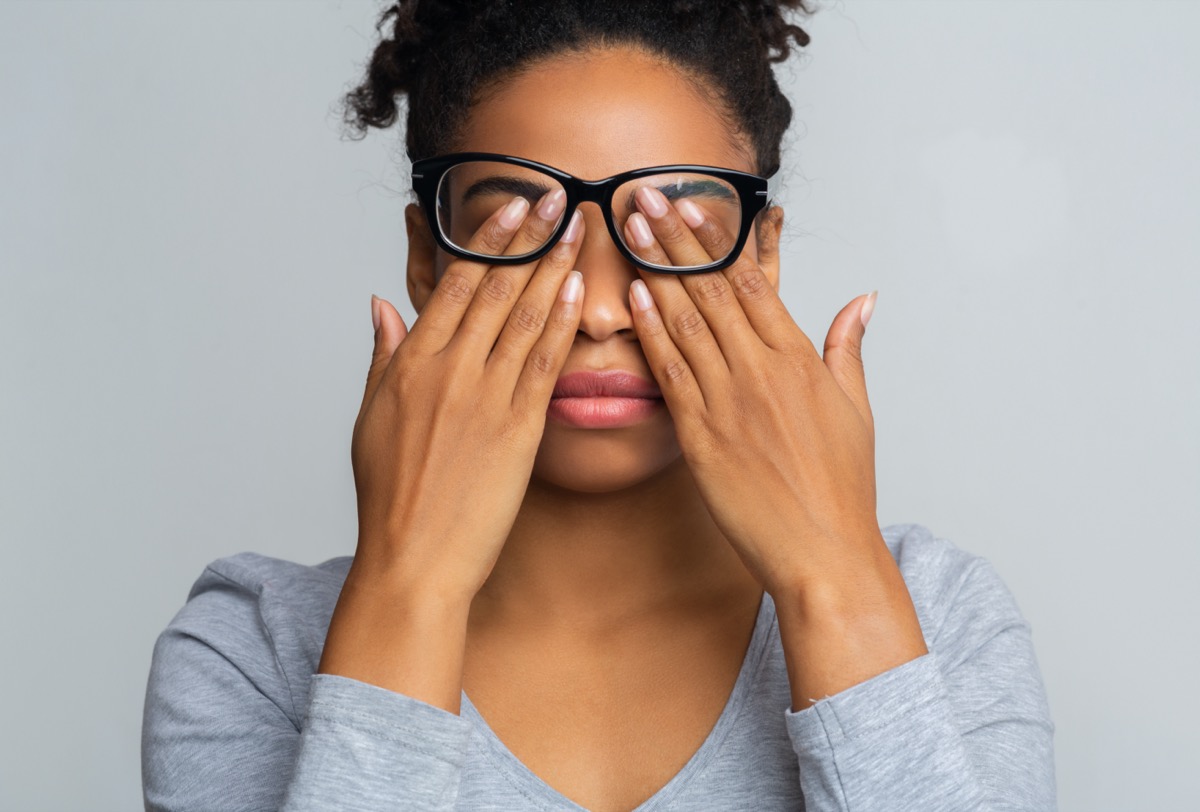Vitamin D has attracted plenty of research and headlines over the past few years, and for good reason: About 40% of Americans have insufficient levels of the vitamin, and scientists are discovering more and more about how important vitamin D is to various body systems and overall health. If you're lacking vitamin D, you might experience some distinct symptoms. Here's what they might be, and what you should do about them, according to experts. Read on to find out more—and to ensure your health and the health of others, don't miss these Sure Signs You've Already Had COVID.
According to the Cleveland Clinic, vitamin D helps keep bones strong by helping them to absorb calcium. Vitamin D also works with the parathyroid glands to keep maintain levels of calcium and vitamin D—our bones are constantly breaking down and rebuilding themselves, so getting enough of both nutrients is important to support that process. Vitamin D also plays a role in supporting the immune system, and not getting enough can lead to a greater risk of illness and infection.

"Vitamin D deficiency is frequent and has been associated with fatigue," says a study published in the journal Medicine. How prevalent is that association? Another study published in the North American Journal of Medical Sciences found that low vitamin D levels were present in more than 77 percent of people who reported fatigue. The Medicine researchers found that people with fatigue who got a single high-dose treatment of vitamin D reported "significant improvement."

Calcium works together with vitamin D not just to ensure strong bones, but to help muscles contract properly. According to a study published in the journal Musculoskeletal Medicine, low vitamin D levels can cause bone and muscle symptoms, including "bone pain, muscle weakness, falls, low bone mass, and fractures."
RELATED: The #1 Sign Your Blood Sugar is "Way Too High"

Vitamin D supports the immune system by helping white blood cells function. Vitamin D also helps to regulate the immune system's response so it doesn't become overactive, and may reduce the risk of autoimmune conditions such as multiple sclerosis, type 2 diabetes and lupus.
If your vitamin D level is low, you might be more susceptible to common infections, including colds, flu and COVID. According to a meta-analysis of 54 studies published in Frontiers in Public Health, vitamin D insufficiency and deficiency are associated with a higher risk of COVID infection, hospitalization, ICU admission and death.
RELATED: Signs Your Gut is "Unhealthy," Say Physicians

Not having an adequate vitamin D level can also lead to mood changes like depression, experts say. "Most individuals in this country have insufficient levels of vitamin D," wrote authors in a study published in Issues in Mental Health Nursing. "This is also true for persons with depression as well as other mental disorders." Vitamin D may support proper brain development and functioning, they say.
RELATED: Habits Secretly Increasing Your Abdominal Fat, Say Physicians

It's a good idea to get your vitamin D level checked by your doctor annually. If your levels are low, they might recommend a supplement. According to the National Institutes of Health, adults are advised to get at least 600 IU of vitamin D each day, between food and supplements (although that number is somewhath controversial, and some doctors believe it should be higher). The NIH notes that the safe upper limit of vitamin D for adults is 4,000 IU a day. And to protect your life and the lives of others, don't visit any of these 35 Places You're Most Likely to Catch COVID.
The post Signs You're Lacking Vitamin D, According to Experts appeared first on Eat This Not That.
----------------
By: Michael Martin
Title: Signs You're Lacking Vitamin D, According to Experts
Sourced From: www.eatthis.com/news-signs-lacking-vitamin-d/
Published Date: Fri, 15 Apr 2022 12:14:45 +0000
Read More
Did you miss our previous article...
https://naturesmart.us/fitness/the-best-oatmeal-recipes-to-lower-inflammation-say-dietitians
 HealthWellnessFitnessBeautyVideosPrivacy PolicyTerms And Conditions
HealthWellnessFitnessBeautyVideosPrivacy PolicyTerms And Conditions
